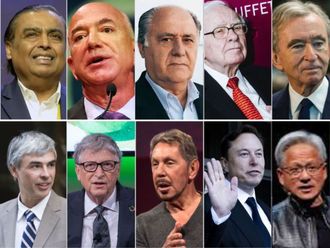London: UK wages grew at their fastest pace in more than six years and the unemployment rate unexpectedly fell, suggesting inflationary pressures are building in the labour market.
Pay excluding bonuses increased an annual 2.9 per cent in the three months through July, the most since early 2009, the Office for National Statistics said Wednesday in London. Total pay growth also quickened to 2.9 per cent. The jobless rate fell to 5.5 per cent, matching the lowest since 2008, from 5.6 per cent in the second quarter.
With companies having to raise wages to attract workers, spare capacity in the labour market is a key metric for the Bank of England as the Monetary Policy Committee considers when to end more than six years of record-low borrowing costs. For now, falling oil prices are suppressing inflation, leading economists to expect the central bank will keep the benchmark rate at 0.5 per cent until early next year.
The decline in the unemployment rate and rise in pay “are likely to be the most important aspects for the MPC,” said Philip Rush, an economist at Nomura International Plc in London. Should the data continue to improve, some members of the committee “are likely to find enough comfort here to vote for a hike in November, global things notwithstanding.”
Hiring Difficulties
The pound climbed after the release of the data and was 0.4 per cent higher at $1.5398 at 9:58am. London time. It strengthened 0.5 per cent to 73.07 pence per euro.
Separate data released by the BOE on Wednesday added to evidence of a tightening labour market. The survey of regional business contacts for the third quarter showed while employment intentions slipped, they “remained consistent with modest employment growth.” The report, compiled between late May and late August, also found a measure of hiring difficulties increased and “was above normal.”
Ten consecutive quarters of growth has left unemployment in Britain at its lowest for seven years, with only the US and Japan boasting lower rates among Group of Seven countries. The jobless rate in the euro region is 10.9 per cent.
The ONS data showed the number of people in work rose 42,000 to 31.1 million in the latest three months. There were some signs of softening, with unemployment increasing 10,000 to 1.82 million, while claims for jobless benefits rose 1,200 in August from July. The rate stayed at 2.3 per cent.
Wages Surge
With inflation around zero for most of this year, UK households are enjoying the first period of sustained real wage growth since the financial crisis. Adjusted for price changes, basic wages grew 2.9 per cent in the latest three months, the strongest since 2002.
Total pay was bolstered by bonuses which grew 17 per cent in July and 3.8 per cent in the three months through July. The ONS said this was due to higher bonuses in financial and business services. Excluding bonuses, pay growth in the private sector quickened to 3.4 per cent in the three month period.
There were signs the jobless rate could fall further in the three months through August. Single-month figures show unemployment was 5.4 per cent in July, the lowest since 2008, and 5.5 per cent in June.
“Working people have received the fastest real-terms rise in over a decade,” Chancellor of the Exchequer George Osborne said in an emailed statement. “But we still face risks both from the global economy and from those at home who would undermine our economic security.”
The figures come as Federal Reserve policymakers gather this week, with economists divided over whether they will raise US interest rates for the first time in almost a decade. A decision to do so could put pressure on their British counterparts to follow suit.
BOE officials see spare capacity in the UK economy being eliminated over the next year, and economists surveyed by Bloomberg predict a quarter-point rate increase in the first quarter.












